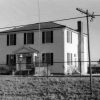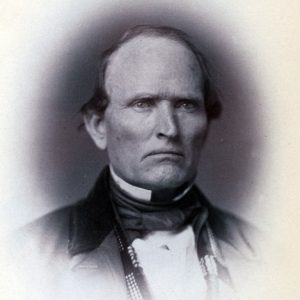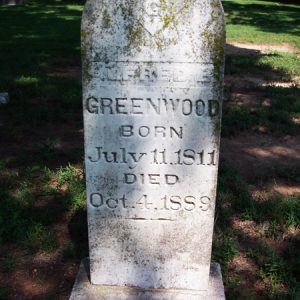calsfoundation@cals.org
Alfred Burton Greenwood (1811–1889)
Alfred Burton Greenwood was an early settler in Benton County who served in local, state, and national public offices for twenty years. During his career, he served as state representative, prosecuting attorney, circuit judge, U.S. congressman, and tax collector for the Confederacy.
A. B. Greenwood, born in Franklin County, Georgia, on July 11, 1811, was the eldest of five children born to Hugh B. Greenwood, a carpenter and cabinetmaker, and Elizabeth Ingram Greenwood. Greenwood was educated in Lawrenceville and Athens, Georgia, where he studied the classics, and he graduated from the University of Georgia. At the age of eighteen, he began the study of law with William Izzard. Admitted to the bar at Monroe, Georgia, in 1832, Greenwood relocated to Decatur in De Kalb County. The next year, he married Sarah A. Hilburn. They had twelve children, eight of whom lived to maturity.
In 1837, Cherokee were being removed by the federal government from Georgia and Tennessee to Indian Territory in Oklahoma along the Trail of Tears. Greenwood was appointed commissary for one detachment, the population divided into groups of 1,000 led by white agents with military escorts and government provisions. The groupings under Chief John Ross, of which Greenwood was a part, went by way of Nashville, Tennessee, crossing the Ohio River at Golconda, Illinois, and the Mississippi River at Green’s Ferry, taking them on a path across Missouri and through Bentonville (Benton County) before reaching Oklahoma. By the time Greenwood’s group reached Nashville, he had heard so much about the new state—Arkansas—that he resigned, returning to Georgia to gather his family and move to Bentonville.
In the spring of 1838, Greenwood established his home in a community of only thirty people, one store, and, with his arrival, one lawyer. For four years after opening his law office, he was the only lawyer in the county. Greenwood was elected to represent Benton County in the Arkansas House of Representatives twice, 1842–1843 and 1844–1845.
On January 4, 1845, the Arkansas General Assembly selected Greenwood as prosecuting attorney for the Fourth Judicial Circuit, which consisted of ten counties. In 1848, the selection process changed when an amendment made the office filled by local, popular vote. In the next two elections (1848 and 1850), the citizens of the fourth circuit elected Greenwood their prosecuting attorney.
In 1850, instead of seeking reelection as prosecuting attorney, Greenwood was elected circuit judge, taking office on March 3, 1851, for the Fourth Judicial Circuit, serving the same ten counties where he had been prosecuting attorney. In 1853, he resigned to run for Congress as a Democrat. His tenure as circuit judge left him forever known as “Judge Greenwood.”
Between 1853 and 1859, Greenwood served three terms in the U.S. House of Representatives for the First District of Arkansas. When seeking his third term in 1856, he was opposed at the Democratic Convention in Batesville (Independence County) by Thomas Carmichael Hindman of Helena (Phillips County). After a long struggle for the nomination, Hindman withdrew, giving incumbent Greenwood the nomination on the 276th ballot. In the general election, Greenwood faced Know-Nothing candidate Hugh French Thomasson, winning handily 15,399 to 6,161. Hindman succeeded Greenwood in 1858.
Notable during Greenwood’s congressional terms was passage of the Kansas-Nebraska Act in the Thirty-third Congress, creating the states of Kansas and Nebraska and allowing popular sovereignty on the issue of slavery, thereby annulling the limitations on slavery previously established by the Missouri Compromise. The act was a precursor to the Civil War; however, Greenwood’s role was not instrumental to its passage.
During his last term in office, Greenwood was selected chairman of the House Committee on Indian Affairs. When Greenwood left Congress, President James Buchanan made him the commissioner of Indian Affairs in the U.S. Department of the Interior from May 13, 1859, to April 13, 1861. While holding this position, Secretary of the Interior Jacob Thompson resigned over the issue of slavery. President Buchanan offered Greenwood this cabinet position. He declined.
Arkansas seceded from the Union in 1861, with Greenwood a Confederate supporter. Confederate president Jefferson Davis first called on Greenwood, aware of his knowledge and friendship to the Indians, to seek the enlistment of Cherokee and Choctaw nations into the Confederate army. Davis’s second interaction with Greenwood was to appoint him tax collector of the state of Arkansas. With the Arkansas Confederate capital in Washington (Hempstead County), Greenwood undertook his duties there and, during December 1864, was credited with the collection of over $2 million.
With the end of the Civil War, Greenwood returned to Bentonville and his law practice. His wife died in 1884, and he died five years later, on October 4, 1889. He was interred in Bentonville’s City Cemetery. The town of Greenwood (Sebastian County) is named in honor of Greenwood’s role as a judge for that county, and Greenwood County, Kansas, received its name as a compliment to Greenwood, who, about the time of the organization of the territory, was commissioner of Indian Affairs and negotiated treaties on behalf of the United States with southern Kansas tribes.
For additional information:
Alvarez, H. G. “Judge Alfred Burton Greenwood, 1811–1889: A Condensed Biography.” The Key 21 (Summer 1986): 26–31.
Funk, Erwin. “Benton County’s Best Known Citizen Prior to the Civil War.” Benton County Pioneer 4 (January 1959): 19–20.
History of Benton, Washington, Carroll, Madison, Crawford, Franklin, and Sebastian Counties, Arkansas: From the Earliest Time to the Present. Chicago: Goodspeed Publishing Co., 1889.
John Spurgeon
Bella Vista, Arkansas








Comments
No comments on this entry yet.